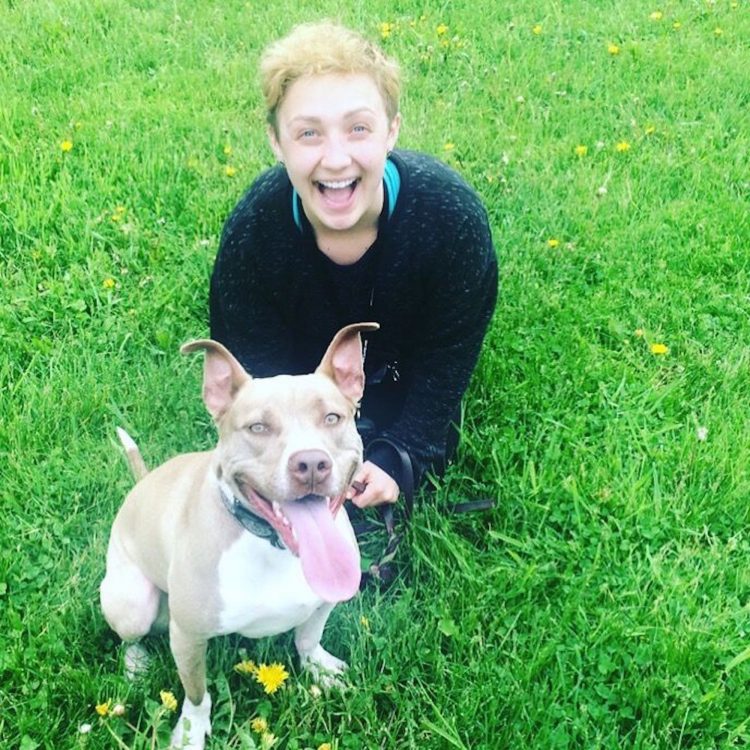For as long as I can remember, I’ve wanted a dog.
• What is Bipolar disorder?
Every birthday, every Christmas, every half-doubting prayer at bedtime, I asked for a dog. But it was never the right time. My grandmother moved in with us, it wasn’t the right time. I was busy with extracurricular, it wasn’t the right time. I was in university, it wasn’t the right time.
Finally, in 2015, it was the right time.
It was the summer after I graduated from undergrad. I was living alone in a beautiful old apartment, I had a stable income and the stars had aligned. I spent every spare minute poring over adoption websites. I connected with a rescue based in Ontario, sent in my paperwork, had my phone interview and two weeks later, my precious pup was en route to New Brunswick.
Peyton arrived for a home visit on August 4, 2015. She was eight months old, a skinny brown thing with her tail tucked tight against her belly.
“She’s really nervous meeting new people,” explained the woman who brought her. “She’ll warm up eventually.”
I made it my life’s goal to earn Peyton’s trust and turn her into a confident, happy dog. With enough love, I knew, anything was possible.
Two years later, I’m bawling my eyes out at obedience class.
Peyton, as it turns out, is not an easy dog. She’s what dog trainers call “reactive” – a fancy word for “people cross the street when they see you coming.”
See, Peyton’s developed pretty serious anxiety. The list of things she’s afraid of includes, but is not limited to: men, men with hats, new people in general, strange dogs, confined spaces, things falling on top of her, water, being reached over, people falling, losing her favorite toys, icicles falling from eaves, bicycles, loud cards, anything falling from the countertop, people knocking on doors and autumn leaves that swirl too fast in the wind.
To Peyton, the world is a scary place. And when she gets scared, she lunges and barks and growls so the scary thing doesn’t approach her. And it works, which is why she keeps doing it.
What I know, and what Peyton doesn’t know, is that she doesn’t need to be afraid of most of these things. When a stranger stops us mid-walk to ask for the time, they are not a super villain with the sole intention of ruining Peyton’s life. But Peyton doesn’t know that, and so she freaks out and I’m left with the embarrassing task of dragging her away while shouting apologies over my shoulder.
“Sorry, she’s nervous.”
“Sorry, she’s scared of men.”
“Sorry, we’re working on it.”
And we are.
Since I adopted Peyton, we have been in an almost constant state of training. Dozens of classes, hundreds of hours of practice, thousands of dollars. Every trainer I’ve worked with has told me some variation of, “Yup, she’s an anxious dog, just keep working at it.” At this particular obedience class, I was crying because I was so embarrassed. The scampering antics of the adorable Boston terrier in the class set her off into a fit of lunging and barking. All the other dogs in the class were indifferent, and here Peyton was in a shrieking rage.
The trainer, a woman named Stephanie who is stern with people and endlessly patient with animals, took me aside.
“Why are you crying?”
“I’m-I’m-I’m em-em-em-embarrassed,” I blubbered.
“Why are you embarrassed?”
“She’s barking. None of the other dogs are barking, I’m worried people will think she’s vicious but she’s actually such a sweet dog…” I began to rattle off insecurities, and Stephanie patiently listened. Finally, I got to the real reason: “I feel like it’s my fault.”
See, Peyton’s not the only one who’s got some issues.
I’ve got mental illnesses, as my mother would say, “up the wazoo.” Bulimia, self-harm, bipolar disorder, anxiety, ADHD — some people collect spoons or stamps, I apparently collect DSM diagnoses. Since I’ve had Peyton, I’ve had two fairly serious episodes, and honestly if it weren’t for her there, it would have probably been more. Pets are not a cure for mental health issues by any means, but when I was sick, Peyton gave me a reason to get up in the morning, to get outside, to make sure I ate and slept and didn’t go out binge drinking for five days at a time. She’s not a therapy dog or a service dog, but she is a constant daily reminder that I have a reason to be alive.
What is frustrating to me is that other people don’t get to see the Peyton I know – the dog who smiles so hard that she sneezes when she’s excited to see you, the dog who snuffles in your ear when you’re crying, the dog who follows you from room to room because she just wants to be near you, the dog whose tail goes so fast that it makes her whole body wiggle, the dog with the clown antics and the goofy face and the big personality. They see a scary dog, a vicious dog, a “bad” dog.
“It’s not your fault,” said Stephanie. “You have nothing to be embarrassed about. You’re doing the best you can. Just be patient with her.”
Patient. That word that comes up again an again in my life.
The therapy will eventually help, just be patient.
The meds will take some time to work, just be patient.
You’ll eventually feel better, just be patient.
I’ve never been good at being patient with myself, but being patient with Peyton is easier. I understand where she’s coming from. She’s afraid, she reacts. For her, there are no mind games, no self-loathing, no disguising your feelings. Just feel and express. Sometimes that expression comes out in unhelpful ways. She’s learning. When she knows better, she’ll do better.
Working with Peyton takes a lot of patience, and through learning to be patient with her, I’ve learned to be patient with myself, too.
When Peyton does something wrong, she’s not doing it to make me mad. She’s not doing it because she’s inherently bad or vicious or spiteful. And when Peyton does something right, she deserves to be recognized and rewarded and celebrated.
When Peyton is scared, she needs comfort. When Peyton is uncertain, she needs direction. When Peyton is stressed, she needs soothing. It is OK to need these things, and it’s OK to need them from other people when you can’t give them to yourself.
Peyton is not an easy dog. She is not a naturally calm or confident dog. She can be hard to deal with at times, but her love is so rewarding it’s more than worth the work. Just because she has issues, doesn’t mean she can’t live a full and happy life. Is it the life I first imagined, when I wished for a dog all those years? Of course not. But that doesn’t mean it’s any less full, any less valuable, any less important.
Regardless of her struggles, Peyton is important and valuable and worthwhile. She matters. She deserves a good home, good friends, good food. She deserves to feel safe and valued and happy and loved.
And, I’m slowly learning, so do I.

Follow this journey here.
Photo via contributor.

